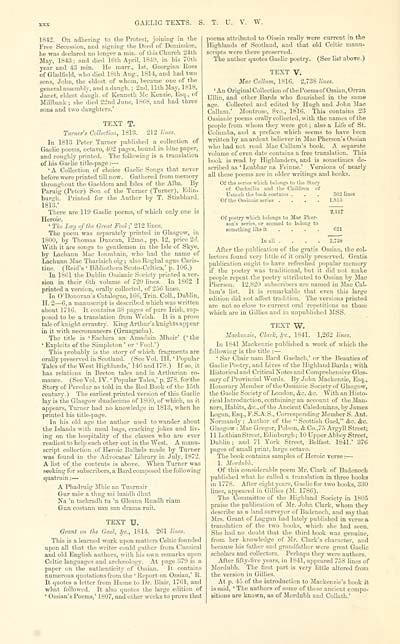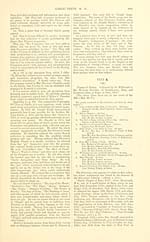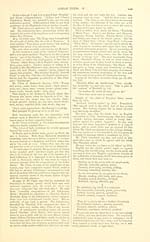Download files
Complete book:
Individual page:
Thumbnail gallery: Grid view | List view

GAELIC TEXTS. S. T. U. Y.
1842. On adhering to the Protest, joining in the
Free Secession, and signing the Deed of Demission,
he was declared no longer a min. of this Church "iith
May, 1843 ; and died 16th April, 1849, in his 70th
year and 43 min. He marr., 1st, Georgina Boss
of Gladfield, who died 18th Aug., 1814, and had two
sons, John, the eldest of whom, became one of the
general assembly, and adangh. ; 2nd, 11th May, 1818,
Janet, eldest daugh. of Kenneth Mc Kenzie, Esq., of
Millbank ; she died 22nd June, 1868, and had three
sons and two daughters.'
TEXT T.
Turner's Collection, 1813. 212 lines.
In 1813 Peter Turner published a collection of
Gaelic poems, octavo, 402 pages, bound in blue paper,
and roughly printed. The following is a translation
of his Gaehc title-page : —
' A Collection of choice Gaelic Songs that never
before were printed till now. Gathered from memory
throughout the Gaeldom and Isles of the Alba. By
Paruig (Peter) Son of the Turner (Turner), Ediu-
burcrh. Printed for the Author by T. Stiubhard.
1813.'
There are 119 Gaelic poems, of which only one is
Heroic.
' The Lay of the Great Fool •' 212 lines.
The poem was separately printed in Glasgow, in
1800, by Thomas Duncan, 12mo., pp. 12, price 2(1.
With it are songs to gentlemen in the Isle of Skye,
by Lachann Mac lonmhain, who had the name of
Lachunn Mac Tharlaich oig ; also Roghal agus Caris-
tine. (Reid's ' Bibliotheca Scoto-Celtica,' p. 106.)
In 1861 the Dublin Ossianic Society printed a ver-
sion in their 6th volume of 720 lines. In 1862 I
printed a version, orally collected, of 256 lines.
In O'Donovan's Catalogue, 166, Trin. Coll., Dublin,
H. 2 — 6, a manuscript is described which was written
about 1716. It contains 38 pages of pure Irish, sup-
posed to be a translation from Welsh. It is a prose
tale of knight errantr}-. King Arthur's knights appear
in it with necromancers (Gruagacha).
The title is 'Eachira an Amadain Mhoir' ('the
' Exploits of the Simpleton ' or ' Fool.')
This probably is the story of which fragments are
orally preserved in Scotland. (See Vol. HI. ' Popular
Tales of the West Highlands,' 146 and 178.) If so, it
has relations in Breton talcs and in Arthurian ro-
mance. (See Vol. IV. ' Popular Tales,' p. 278, for the
Story of Perediir as told in the Red Book of the 16th
century.) The earliest printed version of this Gaelic
lay is the Glasgow duodecimo of 1800, of which, as it
appears, Turner had no knowledge in 1813, when he
printed his title-page.
In his old age the author used to wander about
the Islands with meal bags, ci-acking jokes and liv-
ing on the hospitality of the classes who are ever
readiest to help each other out in the West. A manu-
script collection of Heroic Ballads made by Turner
was found in the Advocates' Library in July, 1872.
A list of the contents is above. When Turner was
seeking for subscribers, a Bard composed the following
quatrain : —
A Phadruig Mhic an Tuamair
Gur mòr a thug mi luaidh dhut
Na 'n tachradh tu 'n Gleann Ruadh rium
Gun costann uan san drama ruit.
TEXT U.
Gi-mit on the Gael, Sfc, 1814. 261 lines.
This is a learned work upon matters Celtic founded
upon all that the writer could gather from Classical
and old English authors, with his own remarks upon
Celtic languages and archisology. At page 379 is a
paper on the authenticity of Ossian. It contains
numerous quotations from the 'Report on Ossian,' R.
It quotes a letter from Hume to Dr. Blair, 1761, and
what followed. It also quotes the large edition of
' Ossian's Poems,' 1807, and other works to prove that
poems attributed to Oisein really were current in the
Highlands of Scotland, and that old Celtic manu-
scripts were there preserved.
The author quotes Gaehc poetry. (See list above.)
TEXT V.
Mac Callum, 1816. 2,738 lines.
'An Original Collection of thePoemsof Ossian, Orran
UUin, and other Bards who flourished in the same
age. Collected and edited by Hugh and John Mac
Callum.' Montrose, 8vo., 1816. This contains 23
Ossianic poems orally collected, with the names of the
people from whom they were got ; also a Life of St.
Columba, and a preface which seems to have been
written by an ardent believer in Mac Pherson's Ossian
who had not read Mac Callum's book. A separate
volume of even date contains a free translation. Tliis
book is read by Highlanders, and is sometimes de-
scribed as ' Leabhar na Feinne.' Versions of nearly
all these poems are in older writings and books.
Of tho SLTÌos wliicli belongs to the .Story-
of Cucluilliii and the Children of
Usnoch the Look contains . . . 302 lines
Of the Ossi.-inic series .... l.Slo
2,117
Of poetry which belongs to Mae Pher-
son's series, or seemed to belong to
something like it . . . . 621
After the publication of the gratis Ossian, the col-
lectors found very little of it orally preserved. Gratis
publication ought to have refreshed popular memory
if the poetry was traditional, but it did not make
people repeat the poetry attributed to Ossian by Mac
Pherson. 12,820 subscribers are named in Mac Cal-
lum's list. It is remarkable that even this large
edition did not affect tradition. The versions printed
are not so close to current oral repetitions as those
which are in Gillies and in unpublished MSS.
TEXT W.
Maclienzie, Clark, ^x., 1841. 1,262 lines.
In 1841 Mackenzie published a work of which the
following is the title : —
' Sar Cbair nam Bard Gaelach,' or 4;he Beauties of
Gaelic Poetry, and Lives of the Highland Bards ; with
Historical and Critical Notes and Comprehensive Glos-
sary of Provincial Words. By John Mackenzie, Esq.,
Honorary Member of the Ossianic Society of Glasgow,
the Gaelic Society of London, &c. &c. With an Histo-
rical Introduction, containing an account of the Man-
ners, Habits, &c., of the Ancient Caledonians, by James
Logan, Esq., F.S.A.S., Corresponding Member S. Ant.
Normandy; Author of the "Scottish Gael," &c. &c.
Glasgow : Mac Gregor, Poison, & Co., 75 Argyll Street;
11 Lothian Street, Edinburgh ; 10 Upper Abbey Street,
Dublin; and 71 York Street, Belfast. 1841.' 376
pages of small print, large octavo.
The book contains samples of Heroic verse : —
1. Morduhh.
Of this considerable poem Mr. Clark of Badenoch
published what he called a translation in three books
in 1778. After eight years, Gaelic for two books, 330
lines, appeared in Gillies (M. 1786).
The Committee of the Highland Society in 1805
praise the publication of Mr. John Clark, whom they
describe as a land surveyor of Badenoch, and say that
Mrs. Grant of Laggan had lately published in verse a
translation of the two books, which she had seen.
She had no doubt that the third book was genuine,
from her knowledge of Mr. Clark's character, and
because his father and grandfather were great Gaelic
scholars and collectors. Perhaps they were authors.
After fifty-five years, in 1841, appeared 758 lines of
Mordubh. The first part is very little altered from
the version in Gillies.
At p. 45 of the introduction to Mackenzie's book it
is said, ' The authors of some of these ancient compo-
sitions are known, as of Mordubh and Collath.'
1842. On adhering to the Protest, joining in the
Free Secession, and signing the Deed of Demission,
he was declared no longer a min. of this Church "iith
May, 1843 ; and died 16th April, 1849, in his 70th
year and 43 min. He marr., 1st, Georgina Boss
of Gladfield, who died 18th Aug., 1814, and had two
sons, John, the eldest of whom, became one of the
general assembly, and adangh. ; 2nd, 11th May, 1818,
Janet, eldest daugh. of Kenneth Mc Kenzie, Esq., of
Millbank ; she died 22nd June, 1868, and had three
sons and two daughters.'
TEXT T.
Turner's Collection, 1813. 212 lines.
In 1813 Peter Turner published a collection of
Gaelic poems, octavo, 402 pages, bound in blue paper,
and roughly printed. The following is a translation
of his Gaehc title-page : —
' A Collection of choice Gaelic Songs that never
before were printed till now. Gathered from memory
throughout the Gaeldom and Isles of the Alba. By
Paruig (Peter) Son of the Turner (Turner), Ediu-
burcrh. Printed for the Author by T. Stiubhard.
1813.'
There are 119 Gaelic poems, of which only one is
Heroic.
' The Lay of the Great Fool •' 212 lines.
The poem was separately printed in Glasgow, in
1800, by Thomas Duncan, 12mo., pp. 12, price 2(1.
With it are songs to gentlemen in the Isle of Skye,
by Lachann Mac lonmhain, who had the name of
Lachunn Mac Tharlaich oig ; also Roghal agus Caris-
tine. (Reid's ' Bibliotheca Scoto-Celtica,' p. 106.)
In 1861 the Dublin Ossianic Society printed a ver-
sion in their 6th volume of 720 lines. In 1862 I
printed a version, orally collected, of 256 lines.
In O'Donovan's Catalogue, 166, Trin. Coll., Dublin,
H. 2 — 6, a manuscript is described which was written
about 1716. It contains 38 pages of pure Irish, sup-
posed to be a translation from Welsh. It is a prose
tale of knight errantr}-. King Arthur's knights appear
in it with necromancers (Gruagacha).
The title is 'Eachira an Amadain Mhoir' ('the
' Exploits of the Simpleton ' or ' Fool.')
This probably is the story of which fragments are
orally preserved in Scotland. (See Vol. HI. ' Popular
Tales of the West Highlands,' 146 and 178.) If so, it
has relations in Breton talcs and in Arthurian ro-
mance. (See Vol. IV. ' Popular Tales,' p. 278, for the
Story of Perediir as told in the Red Book of the 16th
century.) The earliest printed version of this Gaelic
lay is the Glasgow duodecimo of 1800, of which, as it
appears, Turner had no knowledge in 1813, when he
printed his title-page.
In his old age the author used to wander about
the Islands with meal bags, ci-acking jokes and liv-
ing on the hospitality of the classes who are ever
readiest to help each other out in the West. A manu-
script collection of Heroic Ballads made by Turner
was found in the Advocates' Library in July, 1872.
A list of the contents is above. When Turner was
seeking for subscribers, a Bard composed the following
quatrain : —
A Phadruig Mhic an Tuamair
Gur mòr a thug mi luaidh dhut
Na 'n tachradh tu 'n Gleann Ruadh rium
Gun costann uan san drama ruit.
TEXT U.
Gi-mit on the Gael, Sfc, 1814. 261 lines.
This is a learned work upon matters Celtic founded
upon all that the writer could gather from Classical
and old English authors, with his own remarks upon
Celtic languages and archisology. At page 379 is a
paper on the authenticity of Ossian. It contains
numerous quotations from the 'Report on Ossian,' R.
It quotes a letter from Hume to Dr. Blair, 1761, and
what followed. It also quotes the large edition of
' Ossian's Poems,' 1807, and other works to prove that
poems attributed to Oisein really were current in the
Highlands of Scotland, and that old Celtic manu-
scripts were there preserved.
The author quotes Gaehc poetry. (See list above.)
TEXT V.
Mac Callum, 1816. 2,738 lines.
'An Original Collection of thePoemsof Ossian, Orran
UUin, and other Bards who flourished in the same
age. Collected and edited by Hugh and John Mac
Callum.' Montrose, 8vo., 1816. This contains 23
Ossianic poems orally collected, with the names of the
people from whom they were got ; also a Life of St.
Columba, and a preface which seems to have been
written by an ardent believer in Mac Pherson's Ossian
who had not read Mac Callum's book. A separate
volume of even date contains a free translation. Tliis
book is read by Highlanders, and is sometimes de-
scribed as ' Leabhar na Feinne.' Versions of nearly
all these poems are in older writings and books.
Of tho SLTÌos wliicli belongs to the .Story-
of Cucluilliii and the Children of
Usnoch the Look contains . . . 302 lines
Of the Ossi.-inic series .... l.Slo
2,117
Of poetry which belongs to Mae Pher-
son's series, or seemed to belong to
something like it . . . . 621
After the publication of the gratis Ossian, the col-
lectors found very little of it orally preserved. Gratis
publication ought to have refreshed popular memory
if the poetry was traditional, but it did not make
people repeat the poetry attributed to Ossian by Mac
Pherson. 12,820 subscribers are named in Mac Cal-
lum's list. It is remarkable that even this large
edition did not affect tradition. The versions printed
are not so close to current oral repetitions as those
which are in Gillies and in unpublished MSS.
TEXT W.
Maclienzie, Clark, ^x., 1841. 1,262 lines.
In 1841 Mackenzie published a work of which the
following is the title : —
' Sar Cbair nam Bard Gaelach,' or 4;he Beauties of
Gaelic Poetry, and Lives of the Highland Bards ; with
Historical and Critical Notes and Comprehensive Glos-
sary of Provincial Words. By John Mackenzie, Esq.,
Honorary Member of the Ossianic Society of Glasgow,
the Gaelic Society of London, &c. &c. With an Histo-
rical Introduction, containing an account of the Man-
ners, Habits, &c., of the Ancient Caledonians, by James
Logan, Esq., F.S.A.S., Corresponding Member S. Ant.
Normandy; Author of the "Scottish Gael," &c. &c.
Glasgow : Mac Gregor, Poison, & Co., 75 Argyll Street;
11 Lothian Street, Edinburgh ; 10 Upper Abbey Street,
Dublin; and 71 York Street, Belfast. 1841.' 376
pages of small print, large octavo.
The book contains samples of Heroic verse : —
1. Morduhh.
Of this considerable poem Mr. Clark of Badenoch
published what he called a translation in three books
in 1778. After eight years, Gaelic for two books, 330
lines, appeared in Gillies (M. 1786).
The Committee of the Highland Society in 1805
praise the publication of Mr. John Clark, whom they
describe as a land surveyor of Badenoch, and say that
Mrs. Grant of Laggan had lately published in verse a
translation of the two books, which she had seen.
She had no doubt that the third book was genuine,
from her knowledge of Mr. Clark's character, and
because his father and grandfather were great Gaelic
scholars and collectors. Perhaps they were authors.
After fifty-five years, in 1841, appeared 758 lines of
Mordubh. The first part is very little altered from
the version in Gillies.
At p. 45 of the introduction to Mackenzie's book it
is said, ' The authors of some of these ancient compo-
sitions are known, as of Mordubh and Collath.'
Set display mode to: Large image | Transcription
Images and transcriptions on this page, including medium image downloads, may be used under the Creative Commons Attribution 4.0 International Licence unless otherwise stated. ![]()
| Early Gaelic Book Collections > Ossian Collection > Leabhar na Feinne > (34) |
|---|
| Permanent URL | https://digital.nls.uk/80030329 |
|---|
| Description | Selected books from the Ossian Collection of 327 volumes, originally assembled by J. Norman Methven of Perth. Different editions and translations of James MacPherson's epic poem 'Ossian', some with a map of the 'Kingdom of Connor'. Also secondary material relating to Ossianic poetry and the Ossian controversy. |
|---|
| Description | Selected items from five 'Special and Named Printed Collections'. Includes books in Gaelic and other Celtic languages, works about the Gaels, their languages, literature, culture and history. |
|---|

